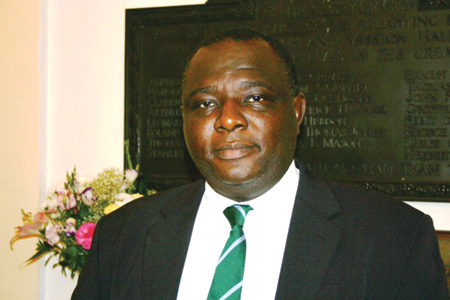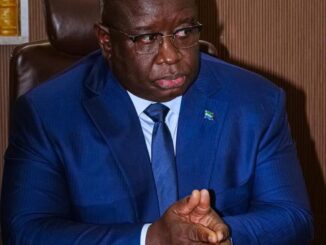
Titus Boye-Thompson
There comes a time when it is tougher to make a decision than to be at the brunt of its implications. Considering the forces that are arrayed against incumbency in African politics, making decisions that affect elections timing and its administration is now becoming ever more difficult.
The experience of the Kenyan Courts in overturning their recently held elections are one way to decipher the implications of making a hasty decision. It is true that every democrat would aim to live up to the expectations of others of the same ideology but in Africa, Sierra Leone more precisely, the pragmatics of our economic situation does not lend to such decisions taken outside the ramifications of their financial meaning.
The Kenyan judges made it clear that their decisions had nothing to do with the conduct of the protagonists in the fray but that their antagonism is directed at the election’s management body, the equivalent of NEC. What their decision means is that it would be easy to invalidate an entire elections due to a fault of the National Elections Commission than to attend to the more pressing complaints of a flawed electoral exercise.
The challenge for Sierra Leone would be whether this country can afford to run a second term as well as to undertake another general election immediately after a failed one that may be gutted out by the Courts. The issues that can be raised in a flawed electoral system may be very much considered to be outside of politics but would the social and economic dynamic withstand such a shock?
Consider then a submission that instead of waiting for the elections to be dismissed summarily at Court after it is clear as it is emerging now to be that the process of attenuating a voters’ register had been flawed since the beginning ad that as of now, the NEC has missed the calendar legalities surrounding the timing of a Final Voters’ Register and a proposed General Elections date, would it not be prudent to impose a delay now so that NEC can meet its own deadlines imposed on it by the Constitution and also by accepted ECOWAS guidelines rather than run a hasty elections and then have that annulled?
Up till now, it has been rather difficult to contemplate the concept of “more time” in a dispensation that has marked itself well for its adherence to democratic principles and a Chairman and Leader of a political party committed to upholding such high democratic credentials. While the electoral process is being dragged in utter disarray, the opposition parties are loudly silent on its ramifications for a credible result. Is it because they are marking their pointers now as matters that could be tested so vigorously in a Court system that may wish to prove its own independence and maximise on the transition potential of a contested elections with the likely winner being an untested executive to be tempted to rule against the incumbent political dispensation?
Whatever the outcome of any such an eventuality, the prospect for a full scale disturbance and a deterioration of the socio-economic dynamic would be catastrophic for this country. Simply put, this country cannot afford the economic, social and political cost of an election overturned.
It is significant that the issues that may very likely underpin an upheaval of that nature be considered now when the economic, social and political cost / benefit are tending towards an equilibrium given the fact that almost all the political parties also need the time and space to get their own internal structures and frameworks in place. In this regard, the prospect for a postponement of the March 7th 2018 elections makes much more sense.
Firstly, the furore at NEC in relation the data register is significant because it has strict legal ramifications that may become intractable if the timelines and deadlines are not met. The potential of a political party claiming that data loss disenfranchised the voters in a particular stronghold would not be tested on the proximity of the areas affected but on a wider question of whether the voter registration process was without significant flaw to have resulted in the loss or non-registration of such numbers of people when it is considered that elections can be won or lost by 1,000 votes or less.
There is also the possibility of the timetable being adhered to in the spirit of the law, given that these timelines have been proscribed as conditions of legality and not just pointers as guides for compliance. A constitutional requirement that is not fulfilled is more likely to Invalidate the entire result as it can easily be argued that the non-fulfilment of the requirement in one area may tantamount to prejudice or otherwise considered deliberate as to logistical failure and the inability of the supervisory body to demonstrate adequate levels of competence and administrative capacity to undertake the tasks assigned to them. These are the very reasons why the Kenyan elections were invalidated by their Supreme Courts.
It is critical to note that in his outright dismissal of the pretences proffered by the NEC as to the validation of the provisional voters register and the impact of the data loss or misplaced data currently under deliberation, Ambassador Alhaji Osman Yansanneh categorically stated that it is prudent that the NEC be given the opportunity to correct itself. As to the manner overall on how this could be managed, it may be prudent for the PPRC to convene a meeting of all the Political parties and to agree a stipulated measure of events and time adjustments under which that correction can take place. That such a measure would have had the approval and acceptance of all the stakeholders would attest to a level playing field in the adjudication of the extant matters and under such circumstances, there is no measure of these same issues be given any legal credence as grounds for contesting the results that may be recorded thereafter.
Given the above, it is likely that a postponement of a period between three to six months would not unduly affect the democratic credentials of the process but attest to the robust measures that may need to be put in place to ensure that the entire process is seen as robustly transparent and compliant of local and international benchmarks and obligations that the electoral process is subject to. Finally, it may be well that political parties continue with the process of choosing their flag bearers as this will also send the signal that the process of succession in the APC, that of coronation in the SLPP and better still that of baptism in the NGC are all well and truly determined and for the country to have a good enough time to get used to the vision and prospects of the respective dispensations.
It is indeed a difficult time for someone like President Ernest Bai Koroma who would be apt to avoid a decision that may seem to favour him but in this case, he must face this as a matter of national security. Good reasons must of force give way to better. The prudence in allowing the structures to legitimize these decisions must be out of his hands and the arguments should be placed squarely before him. As an outgoing President, it is incumbent on him to manage and oversee a clear, fair and credible process rather than be tied up in an emperor’s new clothes robed in a democracy that is very likely to malfunction.
Sierra Leone cannot afford to take the decisions taken in Kenya so it is wise that we avoid coming to that situation by calling all stakeholders together to agree on a smooth path forwards. The prospect of violence and carnage is never too far away from some of those who may not have the same democratic credentials that President Koroma so demonstrably holds dear. It is humbly submitted therefore that we opt for a postponement now, but with clear terms of reference and the objective goal as to determination of a credible electoral contest in 2018.



